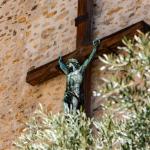Praying For My Community
Psalm 122:1-9
“I’ll pray for you.”
We say it often, but how many times do we actually remember to do it? Our biggest downfall might not be a lack of compassion—it’s probably just not taking time to write down the request and not having a model of praying for others.1
George Whitfield once stated about praying for others:
If we inquire, why there is so little love to be found amongst Christians, why the very characteristic, by which every one should know that we are disciples of the holy Jesus, is almost banished out of the Christian world, we shall find it, in a great measure, owing to a neglect or superficial performance of that excellent part of prayer, Intercession, or imploring the divine grace and mercy in behalf of others.
Some forget this duty of praying for others, because they seldom remember to pray for themselves: and even those who are constant in praying to their Father who is in heaven, are often so selfish in their addresses to the throne of grace, that they do not enlarge their petitions for the welfare of their fellow Christians as they ought; and thereby fall short of attaining that Christian charity, that unfeigned love to their brethren, which their sacred profession obliges them to aspire after, and without which, though they should bestow all their goods to feed the poor, and even give their bodies to be burned, yet it would profit them nothing.2
Psalm 122 is one of the Songs of Ascent. It invites the community to celebrate their arrival in Jerusalem, to recall the defining features of the city, and to pray for God’s unfolding future for the city.3 This ritual is similar to what we do on Memorial Day weekend. We take a trip. We visit a sacred place to remember others. Memorial Day weekend is a time when we think of others.
This psalmist encouraged for the people of Israel to pray for the people of Jerusalem, their city. The people of Israel would pray for their capital city and pray for the peace of the people there. We, as Christians, as a church, can learn from his example.
I think to take this psalm and apply Jerusalem to the modern church would be wrong. The psalm is about people who are going to Jerusalem to worship. Why would they go to worship? They go to worship to love God, but also to be prepared to love others. I think the prayer here in this psalm can apply to the city, not necessarily the church. As the people of God, we are called to pray for others, including the people of our community.
I think this is a model for how we should pray for the city I inhabit. This is a prayer for my community. Wherever God has placed me, God gives me the privilege to pray for my community. While I may pray for the salvation of other people, it doesn’t stop there. The psalm describes five specific prayer requests for my community. These five requests have a ripple effect in the lives of people I pray for.
5 PRAYER REQUESTS FOR MY COMMUNITY
I pray for JOY (Psalm 122:1)
“I rejoiced with those who said to me, “Let us go to the house of the Lord.”” (Psalm 122:1, CSB)
A community should be made up of people who are happy to get along with each other. This is the first prayer request that I should pray for my community. I should pray for joy. In this psalm, David is happy that people want to invite him to go to the local place of worship – the temple. The same is true today. We should be happy to enjoy worshiping with one another in the local community.
The local church should be the focal point of community. People should enjoy meeting one another in the place of worship. Even if there are several churches, these churches can all develop a sense of community.
The sense of community is derived primarily from the fact that God instilled into the hearts of everyone a desire for joy in fellowship. People were designed to enjoy meeting with one another. Whether that is family or friends, God designed us to enjoy getting together. The local church should be modeling how that works in the community. God also desires that we make this place an inviting place and that we invite others to share our joy.
I pray for UNITY (Psalm 122:3)
“Jerusalem, built as a city should be, solidly united,” (Psalm 122:3, CSB)
That joy leads to the second prayer request – unity. If I am with a group of people who are happy to meet with one another, then that should naturally develop a sense of unity. This sense of community builds unity. Joy should lead to a sense of unity with others. A community that loves one another will stand together with one another. My desire for unity should not just be with people in this building. My desire for unity should expand to others as well.
I pray for SECURITY (Psalm 122:6)
“Pray for the well-being of Jerusalem: “May those who love you be secure;” (Psalm 122:6, CSB)
One of the roles of people in government and those who lead the community is to provide security. A city that is secure from its enemies. I should pray for the security of those whom I love in the community. If I truly care for my community, my friends and neighbors, I will pray that they live in security.
A motorcade carrying the security service chief of Gaza came under bullet fire from Israeli troops in the midst of the Israeli-Arab conflict in April 2001. The frightened security official called Yasser Arafat from his car for help.
Arafat, in turn, called the U.S. ambassador, who then called the U.S. secretary of state, Colin Powell. Colin Powell phoned Ariel Sharon, the Israeli prime minister, who ordered the shooting to stop. And it did. The security chief’s connections eventually saved his life.
In a similar way, Christians have a divine connection to the ultimate power of the universe that can make a world of difference in any situation.4
I pray for PEACE (Psalm 122:7-8)
“may there be peace within your walls, security within your fortresses.” Because of my brothers and friends, I will say, “May peace be in you.”” (Psalm 122:7–8, CSB)
Security leads to peace. Yet, even if my house is secure from invasion, it does not necessarily mean that I am at peace in my home. I should pray not just for the physical security, but for the personal peace of my neighbors, friends, and people who live in my community.
“Pursue the well-being of the city I have deported you to. Pray to the Lord on its behalf, for when it thrives, you will thrive.”” (Jeremiah 29:7, CSB)
Just as God told Jeremiah to tell the people of Israel to pray for the city they lived in captivity to have peace, God expects us to take root in our communities and pray for the peace of of our cities. God expects us to pray peace for the people in the community. This is the same chapter and section where we read the famous words that people like to quote:
“For I know the plans I have for you”—this is the Lord’s declaration—“plans for your well-being, not for disaster, to give you a future and a hope.” (Jeremiah 29:11, CSB)
We will never discern God’s plans for us in the place He has for us, until we start to plant roots, get involved, and start to pray for the people in the community He has placed us. We pray for the peace of others, and God will reveal His plan.
I pray for PROSPERITY (Psalm 122:9)
“Because of the house of the Lord our God, I will pursue your prosperity.” (Psalm 122:9, CSB)
Joy, unity, security, and peace should naturally lead to prosperity. When I pray for people in my community, I should pray that they are better off today than they were yesterday. I should pray that they will be better off next year than they were this year. This kind of prosperity, which is rooted in the character of God, benefits everyone. One can be rich without God, but one cannot be prosperous. Prosperity involves more than just money and property.
“So the Lord blessed the last part of Job’s life more than the first. He owned fourteen thousand sheep and goats, six thousand camels, one thousand yoke of oxen, and one thousand female donkeys. He also had seven sons and three daughters. He named his first daughter Jemimah, his second Keziah, and his third Keren-happuch. No women as beautiful as Job’s daughters could be found in all the land, and their father granted them an inheritance with their brothers. Job lived 140 years after this and saw his children and their children to the fourth generation. Then Job died, old and full of days.” (Job 42:12–17, CSB)
In Job’s case, this prosperity came after he prayed for others.
“After Job had prayed for his friends, the Lord restored his fortunes and doubled his previous possessions.” (Job 42:10, CSB)
My praying for the prosperity of others can prevent God’s judgment on my sin and stupid ways. Why? Because praying for others defeats the power of selfishness.
“Now take seven bulls and seven rams, go to my servant Job, and offer a burnt offering for yourselves. Then my servant Job will pray for you. I will surely accept his prayer and not deal with you as your folly deserves. For you have not spoken the truth about me, as my servant Job has.”” (Job 42:8, CSB)
I should be praying for the prosperity of others as well. In this case, Job’s prosperity did not come about because he prayed for others. It came out of a natural outflow of his desire to follow God’s intention about a matter, even a matter he did not completely understand.
Prosperity should be a natural outflow of a person’s desire to follow God. When individuals follow God, that builds a community of people who want to follow God. This community influences others. As allow God to help me make a positive contribution to my local community, it benefits and prospers everyone.
That employer can bring new jobs into the area, which benefits others. That government official provides necessary community services like good roads and utility improvements, which benefits everyone. My prosperity in the community should benefit others. That is why I pray for the prosperity of others.
So I pray for my community:
I pray for joy.
I pray for unity.
I pray for security.
I pray for peace.
I pray for prosperity.
Why do I pray for my community?
“Because of the house of the Lord our God…” I pray for others because I am part of the house of the Lord my God. I pray for others because God desires my community to be His community. It starts with praying for them.
1 John D. Barry and Rebecca Kruyswijk, Connect the Testaments: A One-Year Daily Devotional with Bible Reading Plan (Bellingham, WA: Lexham Press, 2012).
2 George Whitefield, Selected Sermons of George Whitefield (Oak Harbor, WA: Logos Research Systems, Inc., 1999).
3 W. Dennis Tucker Jr., “Psalms 107–150,” in Psalms, ed. Terry Muck, vol. 2, The NIV Application Commentary (Grand Rapids, MI: Zondervan, 2018), 745.
4 Craig Brian Larson and Phyllis Ten Elshof, 1001 Illustrations That Connect (Grand Rapids, MI: Zondervan Publishing House, 2008), 345.














